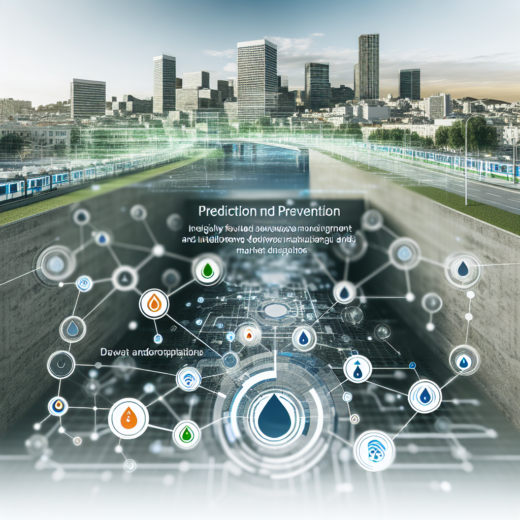Introduction
In modern cities, where urbanization is expected to intensify, the pressure on infrastructure systems, including wastewater management, is at an all-time high. Intelligent sewage monitoring systems represent a promising frontier in addressing these challenges, employing cutting-edge technologies to transform traditional sewage infrastructure into advanced, autonomous networks. These systems not only ensure environmental compliance and sustainability but also empower cities to anticipate issues before they turn into disasters.
The Innovation Potential
Emerging technologies like the Internet of Things (IoT), big data analytics, and artificial intelligence (AI) are at the core of intelligent sewage monitoring systems. By deploying sensors throughout the sewage infrastructure, these systems gather real-time data on flow rates, chemical composition, and potential blockages. The data is then analyzed using AI algorithms to predict maintenance needs, detect anomalies, and optimize operations.
Incorporating innovation in this area opens up vast potential for enhancing the efficiency and sustainability of urban planning. IoT-enabled systems can quickly identify leaks or overflows that would otherwise go unnoticed, mitigating risks to public health and the environment. Moreover, these intelligent systems can contribute to water conservation by ensuring optimal wastewater recycling.
Market Disruption
The integration of intelligent systems into the sewage infrastructure sector signifies a disruptive change from a reactive to a proactive approach. Traditionally, maintenance of sewage systems relied on scheduled inspections and reactive repairs, often resulting in inefficient use of resources and delayed responses to issues. Intelligent systems, with their predictive capabilities, revolutionize this model, offering significant cost savings and operational efficiencies.
Startups entering this space have a unique opportunity to capitalize on this disruption. As municipalities and corporations look to upgrade their systems, they need technology providers who can offer innovative, tailor-made solutions. Engaging with city planners and environmental regulators can further establish startups as key players in this changing environment.
Key Challenges
Despite the genuine opportunities, startups in the intelligent sewage monitoring space face several challenges. The foremost is the integration of new technology with existing infrastructure. Many sewage systems are decades old and upgrading them with modern technology requires significant investment and expertise. Additionally, the integration of new systems must comply with stringent environmental regulations that vary by region.
Another challenge lies in data management. The sheer volume of data collected by sensors necessitates robust data analytics capabilities and secure data handling practices to prevent breaches. Startups need to build or partner with companies specializing in data management to ensure their solutions are viable and secure.
Unique Opportunities for Startups
While the challenges are considerable, the opportunities are equally significant. Startups can differentiate themselves by developing niche solutions for specific infrastructure types or geographical regions. By understanding local regulations and infrastructure needs, startups can tailor their systems to offer unrivaled accuracy and relevancy.
Furthermore, partnerships with established companies can enhance credibility and provide access to valuable resources and networks. Collaborating with tech companies, environmental consultancies, and urban development specialists allows startups to strengthen their technological core and expand their market reach.
Strategies for Success
For startups venturing into the intelligent sewage monitoring market, several strategies can ensure success:
Fundraising: Crafting a compelling narrative around the societal and environmental impact of intelligent sewage systems can attract investors. Showcasing real-world case studies where predictive maintenance has prevented disasters can also highlight the financial benefits to potential investors.
Scaling Operations: As demand grows, having a scalable model is critical. Startups should focus on modular designs that allow for easy expansion and scalability of their solutions. An agile development approach can ensure quick adaptation to market needs and regulatory changes.
Achieving Product-Market Fit: Understanding customer needs is crucial. Startups should engage closely with municipal clients to gather feedback and iterate on their product. Providing a user-friendly interface that translates complex data into actionable insights can make or break market acceptance.
Customer Acquisition: Building relationships with key decision-makers in city councils and environmental agencies can accelerate adoption. Launching pilot projects to demonstrate effectiveness can be an persuasive tool. Startups can also participate in industry forums and seminars to showcase their innovations.
Distinctive Aspects of Business Model and Technology
Intelligent sewage monitoring startups often possess unique business models and technologies. Subscription-based models can provide consistent revenue streams while ensuring continuous service and updates for clients. Meanwhile, advancements in AI and machine learning offer unique technological propositions, allowing for bespoke solutions that can evolve with infrastructure demands.
Case Studies and Real-World Examples
Several startups have illustrated the potential success in this field. For instance, firms like EmNet have been at the forefront, using intelligent systems to address urban water challenges in US cities. Their solutions demonstrate how predictive analytics and real-time monitoring have transformed municipal wastewater management, saving costs and preventing overflows that can harm the environment.
Another example is the Dutch firm, Aquacolors, which combines IoT technology with a proprietary algorithm to optimize the energy consumption of sewage treatment facilities, showcasing how intelligent systems can contribute to sustainability and cost-efficiency.
Conclusion
Intelligent sewage monitoring systems represent a monumental shift in managing one of the most critical yet overlooked urban infrastructure components. By embracing innovation, startups have the opportunity to redefine traditional sewage systems, offering cities a sustainable, efficient future. While challenges exist, the potential to drive market disruption and societal benefits is vast—a promising endeavor for entrepreneurs, investors, and tech enthusiasts eager to contribute to a smarter urban environment. Balancing innovation with practical application, these systems are poised to become vital in maintaining urban health and infrastructure integrity in the years to come.

